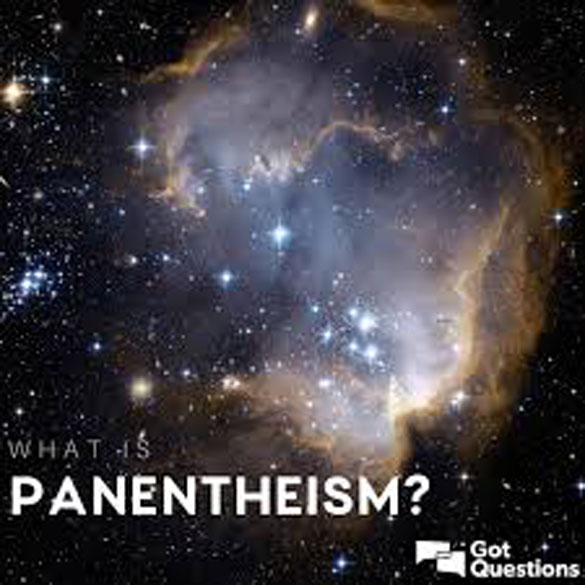Silken Lies: Panentheism as the Spider’s House the Qur’an Warned About

By Naseer Ahmed, New Age Islam
23 May 2025
In the parable of the spider’s house (Qur’an 29:41), God exposes the psychological and spiritual frailty of those who take protectors besides Him. Their beliefs, however intricate, are like webs spun without anchor—beautiful in form, but threadbare in substance. Dr. Adis Duderija’s latest essay in New Age Islam, promoting a synthesis between panentheism and Tawhid, serves as an apt case study in this very phenomenon. One finds elegance, abstraction, even poetic appeal—but not divine authority, nor coherence with the Qur’an.
Panentheism, the belief that God is both immanent within and transcendent beyond the universe, finds a seductive theological vocabulary in process-relational thought. It allows the modern mind to reconcile metaphysical fluidity with spiritual yearning. But this conceptual ease comes at a cost: the erosion of moral clarity, accountability, and above all, the Qur'an's uncompromising vision of monotheism.
Why Pure Tawhid Provokes Aversion
The Qur’an offers a psychological insight into why such theological evasions are attractive:
"When Allah alone is mentioned, the hearts of those who do not believe in the Hereafter shrink with aversion; but when those [worshipped] besides Him are mentioned, immediately they rejoice." (Qur’an 39:45)

This aversion is not merely doctrinal; it is emotional. The mention of a singular, sovereign God—without intermediaries, without personalization—brings discomfort to those uncommitted to the Hereafter. It introduces a God who sees through rituals, who demands inner transformation, and who offers no buffer for indulgence. In contrast, panentheism offers a divine-human feedback loop: a God who evolves with human history, negotiates moral standards, and delights in metaphor. It is no surprise that such a deity is more palatable.
Spiritual Projection vs. Revelation
Duderija’s attempt to marry Tawhid with panentheism borrows heavily from the mystical tradition of Ibn al-Arabi. But the Qur’an draws a clear boundary between spiritual projection and revealed truth. It calls upon believers to test all claims against its unambiguous moral compass. The panentheistic God—shifting, evolving, relational—is simply not the God of the Qur’an, who declares:
“Say: Call upon those whom you claim besides Allah. They do not possess the weight of an atom in the heavens or the earth, nor do they have any share in them, nor is He assisted by any of them.” (Qur’an 34:22)
Panentheism, even when dressed in Islamic metaphysics, amounts to assigning partners to Allah—not always in worship, but in moral and ontological function. It reintroduces the intercessory cosmos that Islam came to abolish.
The Satanic Verses as an Insulation from Panentheism
In my opinion, the incident of the so-called “Satanic Verses” was divinely permitted to serve as a historical firewall against panentheism. In that moment, when the Prophet was momentarily induced to utter words that seemed to allow intermediaries (al-Lat, al-Uzza, and Manat), the Divine response was immediate and emphatic. The incident was abrogated and publicly corrected:
“We did not send before you any messenger or prophet except that when he recited [the message], Satan threw into it [some misunderstanding]. But Allah abolishes that which Satan throws in; then Allah makes precise His verses.” (Qur’an 22:52)
The message? No intermediaries. No compromise. Tawhid is non-negotiable.
And yet Satan seems to have clawed his way back—not through pagan idols this time, but through abstract metaphysics and mystical prose. Panentheism reintroduces the very dilution that Islam purged. The cobweb is back.
The Mindset of the Weaver: When Prestige Blocks Prophecy
Adis Duderija’s bombastic reply to criticism—loaded with academic credentials, links to self-referential scholarship, and dismissive tone—tells us more about the spiritual condition the Qur’an addresses than he perhaps intended. Consider his words:
“As someone who has been part of scholarly discussions on the Qur'an for two decades (and published 9 scholarly books, over 100 academic articles…), I must confess that I find your inflated confidence in your approach completely misplaced.”
This isn’t just disagreement—it’s ego with citations. The vehemence with which he dismisses a presuppositionless, intra-Qur’anic, linguistic-logical methodology betrays an insecurity that has grown over years of spinning metaphysical cobwebs under the illusion of “real scholarship.”
This is the spiritual archetype the Qur’an captures in stunning psychological precision:
“When Allah alone is mentioned, the hearts of those who do not believe in the Hereafter shrink with aversion…” (Qur’an 39:45)
and again:
“They sell the faith they owe to Allah and their pledged word for a small price…” (Qur’an 3:77)
In today’s world, the “small price” is prestige in the Western academy, publication in peer-reviewed journals, and YouTube channels dressed in the aura of intellectualism. But the transaction is the same: divine revelation is repackaged into abstract universalism, emptied of moral bite, and offered back to the ummah as spiritual-sounding scholarship.
From a psychological standpoint, this is textbook status preservation. Cognitive dissonance is most intense not when a person is uninformed, but when their entire self-image is invested in a flawed paradigm. To abandon the mystical-philosophical tower is to admit that years of academic effort were built on sand. Hence, the furious need to delegitimize competing readings not by addressing arguments, but by appealing to authority, quantity, and credentials.
This is also why the Qur’an says:
“When you recite the Qur’an, We place between you and those who do not believe in the Hereafter a veil invisible.” (Qur’an 17:45)
It is not the text that is veiled, but the ego that is armoured. A scholar whose sense of self is built on being a bridge between Islam and Western metaphysics will not welcome a direct, intra-Qur’anic, moral reading. It threatens his house—and the spider reacts not with reason, but with emotional defensiveness.
In modern psychological terms, it is a blend of motivated reasoning, intellectual overcompensation, and group-conferred immunity to critique. The Qur’an, however, sees this not as an intellectual failure, but a moral one. The real “limitation of methodology” is not logical—it is spiritual.
Projecting Rigidity onto Moral Clarity
It is ironic that those who advocate for "fluid," "contextual," or "progressive" interpretations have never gone as far in salvific inclusivism or moral clarity as the very person they label a text fundamentalist. The same methodology Adis decries as “narrow” is the one that has shown—without deviating an iota from the Qur’anic text—that the Qur’an supports:
• Salvific Inclusivism that doesn’t exclude sincere polytheists who didn’t know better (2:62, 5:69, 22:17, 7:33),
• Faith-neutral principles of justice in verses of war (e.g., by correctly understanding Kafaru as those who oppress and persecute, their beliefs are immaterial. The same verses become a command to fight the Muslims if they become oppressors),
• And a consistent framework of moral accountability, not tribal religiosity.
These are not mystical projections or metaphysical sleights of hand. They emerge directly from the Qur’an when its terms are respected on their own terms, not retranslated to match modern Western philosophical appetites.
So why the label “text fundamentalist”? Because it serves as a shortcut to dismissal, a rhetorical firewall to protect the fragile architecture of derivative theosophy from being disarmed by the raw force of Qur’anic coherence. It’s easier to call your critic a “literalist” than to explain why your own God evolves with history and negotiates moral standards like a cosmic parliamentarian.
In the psychology of belief, this is a known defence: projecting rigidity onto those who are actually more textually consistent, because deep down, one suspects the moral clarity of the Qur’an might expose the evasions of one’s own paradigm.
Thus the spider spins—and the web grows intricate, elegant, and perilously detached from anchorage.
“The parable of those who take protectors other than Allah is that of the spider, who builds for itself a house; but truly, the flimsiest of houses is the spider’s house—if they but knew.” (Qur’an 29:41)
-----
A frequent contributor to NewAgeIslam.com, Naseer Ahmed is an Engineering graduate from IIT Kanpur and is an independent IT consultant after having served in both the Public and Private sector in responsible positions for over three decades. He has spent years studying Quran in-depth and made seminal contributions to its interpretation.
URL: https://www.newageislam.com/debating-islam/silken-lies-panentheism-spider-quran/d/135638
New Age Islam, Islam Online, Islamic Website, African Muslim News, Arab World News, South Asia News, Indian Muslim News, World Muslim News, Women in Islam, Islamic Feminism, Arab Women, Women In Arab, Islamophobia in America, Muslim Women in West, Islam Women and Feminism
